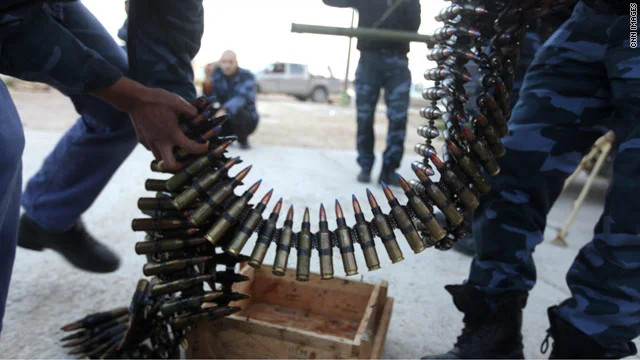Can the Libyan "Cease-Fire" Be Trusted?
By Amar C. Bakshi, CNN
Libya's government announced an "immediate" cease-fire on Friday, but witnesses in the besieged coastal city of Misrata told CNN that a fierce pro-government assault is persisting and casualties are mounting.
I reached out to Libya experts to help interpret Moammar Gadhafi’s motives. Is he going to continue his assault despite his rhetoric? Will he stop fighting to buy himself time? Is he trying to rupture the international coalition arrayed against him?
Dr. Mary-Jane Deeb, the Chief of the African and Middle Eastern division at U.S. Library of Congress (the views expressed are her own), believes this cease-fire is just a ruse.
“It may be a cover,” she said. “He is not going to withdraw. He is not going to go back. He is not going to give up. That is not his tactic or his strategy.”
She also warns that the U.N. resolution “may push Gadhafi to move faster … against Benghazi to be able to control the country. He probably figures he can move forward until the Western powers decide who is going to be the policeman of this U.N. resolution.”
Dr. Dirk J. Vandewalle, an associate professor of government at Dartmouth College, does not believe Gadhafi will make any major moves in the short term.
“The [cease-fire] announcement … is a way of stalling developments to figure out what they can do,” he said. “This is more a tactical delay. The regime has no actual, real intention of coming to terms and wanting to deal with the opposition."
The purpose of the cease-fire, he contends, is to "throw a wrench in what has been, until now, a careful calibration of efforts to reach [international] agreement to go in [to Libya]." He thinks Gadhafi may be hoping that agreeing to a cease-fire will break up the coalition arrayed against him and enable him to go back to the U.N. and argue against any international action against Libya.
Mansour El-Kikhia, a political science professor at the University of Texas at San Antonio, agrees that the cease-fire is a “stalling tactic.”
“The regime knows it is over,” El-Kikhia said. “It is trying to hold on for as long as it can.
“Libya’s rulers are like hyenas. They are survivalists. They create chaos, and in chaos they look for opportunity. Gadhafi is smart enough to see the whole word is against them.”
So what was the purpose of the U.N. resolution? James Lindsay, an expert at the Council on Foreign Relations, isn’t sure.
“It’s unclear what the objectives of the United States are,” Lindsay said. “Is the United States looking merely to help defend rebel territory, or has the administration committed itself actively to work to roll back and oust Col. Gadhafi? We have to wait until this afternoon to see what the mission is and what they are committing themselves to.
“The president can expect to see some withering things written about his decision-making procedures by his critics. If the president was willing to go into Libya, why not go in sooner? Why wait until pro-Gadhafi forces were approaching Benghazi?”
El-Kikhia believes this was a preventative resolution. Without the U.N. vote, he says, there would have been “massacres” in Benghazi.
“Gadhafi would do what he did in Tripoli: put everything in lockdown, close them off, make everything seem normal and then send gangs at night to pick people off,” El-Kikhia said. “Gadhafi was not joking when he said ‘from house to house.’ ‘Zenga to zenga’ means ally to ally, house to house, room to room, cupboard to cupboard.”
So with a disaster in Benghazi hopefully averted, the international community confronts Lindsay’s question of what happens next.
As Deeb notes, stopping Gadhafi’s forward motion is much easier than rolling him back.
“The country is huge,” she said. “Gadhafi is well-armed and quite ruthless. I don’t think it is in the cards that Gadhafi gets pushed back, because short of major bombing or major invasion of Libya, I don’t see how this can be done. It would not be easy by any stretch of the imagination.”
Regardless, all the analysts agree that Gadhafi’s days are numbered.
“He has lost all legitimacy and all credibility,” Deeb said. “In fact, even if he does win militarily, he really has – in the final analysis – lost because he has lost all support from the international community. And I don’t mean just the West. The Arab League has thrown him out. The Arab world is not supporting him. Internally, he will be holding on to power just by force. But how long can you do that? How long can you survive as a head of state just purely by using force? Burma is an example. There are very, very few places where someone can remain in power with so little internal support."
